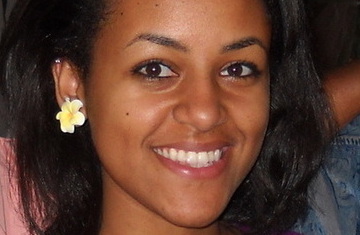
Above: Rebecca Emiru explains why you should vote for her
so she takes part in an entrepreneurship program in Kenya.
Monday, January 31, 2011
You should vote for me because I will use this opportunity to begin making a difference. I hope to use this program as a stepping stone to a career in entrepreneurship and development in East Africa. I am currently a senior Political Science major at Amherst College. My experiences working with and leading groups on my campus, volunteering abroad, and interning with various organizations- including the United Nations- all led to my interest in social entrepreneurship as an alternative to the current development paradigm.
A social entrepreneur is someone whose returns benefit not just themselves but the community of which they are a part. By extension, social entrepreneurship is an approach to business ventures whose returns are not necessarily monetary and whose benefits are extended beyond the involved individual to the group in which they live. Social entrepreneurship represents a way of actively tackling social problems at the local level rather than waiting for government policies to do the trick. It represents a very necessary fusion of a practical, business approach with an ideological approach that addresses structural societal problems.
Essentially, the social entrepreneur has to have a clear understanding of how markets contribute to poverty alleviation. Markets are the primary means through which rural communities relate to urban centers and global markets and rural communities in turn are defined by their distance from cities and in their ability to transport their agricultural goods to markets where these can be sold. For instance, in Ethiopia, the largest producer of coffee in Africa, markets are essential to rural coffee farmers to sell their crops but also to keep abreast of the developments of the coffee market. Any attempt at rural poverty alleviation must address this fundamental feature of rural communities. Thus, facilitating access to markets can alleviate rural poverty in two ways. First, through the improvement of infrastructure such as roads and communication, rural actors can have better access to markets and information regarding their goods. Second, structures can be built that improve the position of rural actors within the market to bargain and act autonomously. To return to the example of Ethiopia, the establishment of the Ethiopian Commodities Exchange by Eleni Gebremedhin gave coffee farmers accurate information about the global coffee market so that they could make more informed decisions.
If we can capitalize on the connection between markets and poverty alleviation through social entrepreneurship, then we can strengthen Africa’s role in the 21st century significantly. Regardless of how much money aid donors pledge to send or how many loans the World Bank and IMF decides to lend or how many well-meaning activists Western countries dispatch, the fate of Africa lies in the hands of its inhabitants. There are two possible outcomes. On the one hand, Africa may continue to serve as a source of raw materials and markets for the global economy, serving as an object to be spoken of and rather than spoken to. On the other hand, Africans can change this negative trajectory by addressing the health pandemics, demanding more representative government, and adapting economic and political models to its own needs. This change can only come about if the masses of people will it to, coupled with responsive and responsible leadership. Although often cited as a repository of bad leadership, the continent also has a history of innovation. Politically, the African Socialism of Julius Nyrere, the pan Africanism of Kwame Nkrumah and the “people’s power” philosophy of the African National Congress and the United Democratic Front in South Africa demonstrate that Africa is a source of ground-breaking custom-built solutions. This role can be expanded in the 21st century as Africa continues to occupy this position. For instance, the active participation of developing countries in the global dialogue regarding climate change has expanded the focus from conservation and reduction of emissions to include sustainable development and the harm done to less-developed nations by industrialized nations in the developed world.
I want to be part of the Innovation Institute because it rejects the traditional donor-recipient relationship between the developed and developing world. Instead, the program emphasizes the fact that participants are there to learn rather than to give, which enables a two-way exchange between the community and program participants, like me. By making the needs and choices of the local community paramount, ThinkImpact is facilitating people’s empowerment, which is more long-lasting than any shipment of supplies.
—
Post via Tsehainy.com.


























